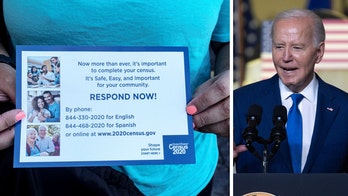Rick Bright: 2020 could be 'darkest winter in modern history' without better COVID-19 planning
HHS whistleblower Rick Bright delivers his opening statement to the House Energy and Commerce Subcommittee on Health hearing on the COVID-19 response.
Get all the latest news on coronavirus and more delivered daily to your inbox. Sign up here.
Rick Bright, former director of the Biomedical Advanced Research and Development Authority (BARDA), went before Congress Thursday warning that the coronavirus pandemic will only get worse without a proper plan, blaming the Trump administration for not taking his warnings seriously.
Bright, who has a Ph.D. in immunology, previously filed a whistleblower complaint claiming that he was involuntarily removed from BARDA and reassigned to a post with the National Institutes of Health after he refused to go along with messages from the administration that promoted chloroquine, a malaria drug that had not been proven to be effective on COVID-19.
OUSTED HHS OFFICIAL RICK BRIGHT FILES WHISTLEBLOWER COMPLAINT
“Our population is being paralyzed by fear stemming from a lack of a coordinated response and a dearth of accurate, clear communication about the path forward,” Bright told lawmakers, before offering a grim prediction for what could happen if proper steps are not taken now.
“Without better planning, 2020 could be the darkest winter in modern history,” Bright warned. In his prepared written statement, he said the coronavirus pandemic “has the potential to eclipse the devastation wrought by the 1918 influenza which globally claimed over 50 million lives,” referring not just to illnesses, but the economic and societal impacts as well.
CLICK HERE FOR FULL CORONAVIRUS COVERAGE
President Trump said in a Thursday morning tweet that he does not know Bright but believes he “is a disgruntled employee” who “should no longer be working for our government[.]”
CLICK HERE TO GET THE FOX NEWS APP
Bright’s testimony follows this week’s warning by Dr. Anthony Fauci, the government’s top infectious disease expert, that a rushed re-opening of stores and lifting stay-at-home restrictions could “turn back the clock,” seeding more suffering and death and complicating efforts to get the economy rolling again.
Bright -- the former director of the Biomedical Advanced Research and Development Authority – criticized HHS leadership for their response to the pandemic and claimed that he was relegated to a lower position because he disagreed with the Trump administration’s push to tout “drugs, vaccines and other technologies that lack scientific merit.”
“I believe this transfer was in response to my insistence that the government invest funding allocated to BARDA [the Biomedical Advanced Research and Development Authority] by Congress to address the COVID-19 pandemic into safe and scientifically vetted solutions, and not in drugs, vaccines and other technologies that lack scientific merit,” Bright said in his written testimony.
He added: “HHS leadership was dismissive about my dire predictions about what I assumed would be a broader outbreak and the pressing need to act, and were therefore unwilling to act with the urgency that the situation required.”
BARDA, which Bright had until recently been the head of, is the HHS office responsible for procurement and development of countermeasures to everything from pandemic influenzas and emerging diseases to bioterrorism.
In his whistleblower complaint, Bright says he was demoted because he would not permit the widespread use of hydroxychloroquine, a malaria drug that the president touted as being effective in treating patients with COVID-19.
An analysis of the use of the drug last month to treat COVID-19 patients in U.S. veterans hospitals found no benefit to using the drug and that there were more deaths among those given hydroxychloroquine versus standard care.
The nationwide study was not a rigorous experiment. But with 368 patients, it’s the largest look so far at hydroxychloroquine with or without the antibiotic azithromycin for COVID-19.
Bright’s comments sharply contrast those of the president, who has said that any reoccurrence of the contagion in the fall or winter of 2020 will be the “embers” that can easily be contained. Other government public health officials, however, have warned that strict cautions will still need to be taken throughout the summer and fall to prevent a second wave of infections.
Fox News' Andrew O'Reilly and The Associated Press contributed to this report.





